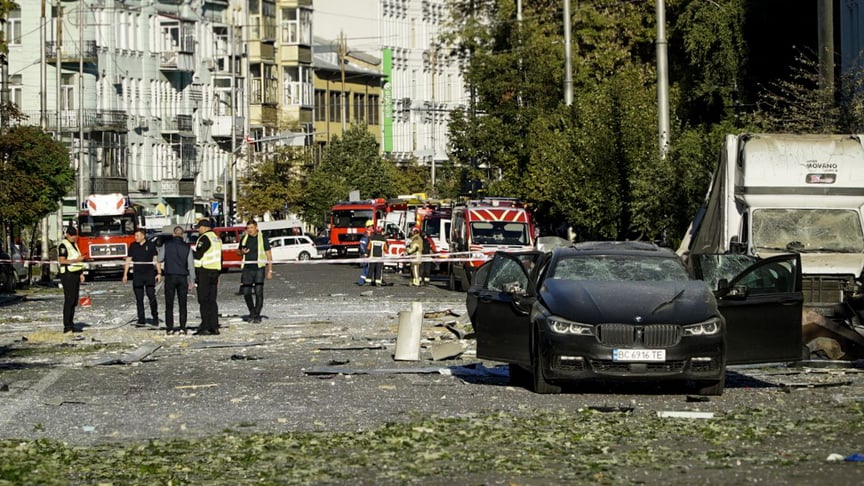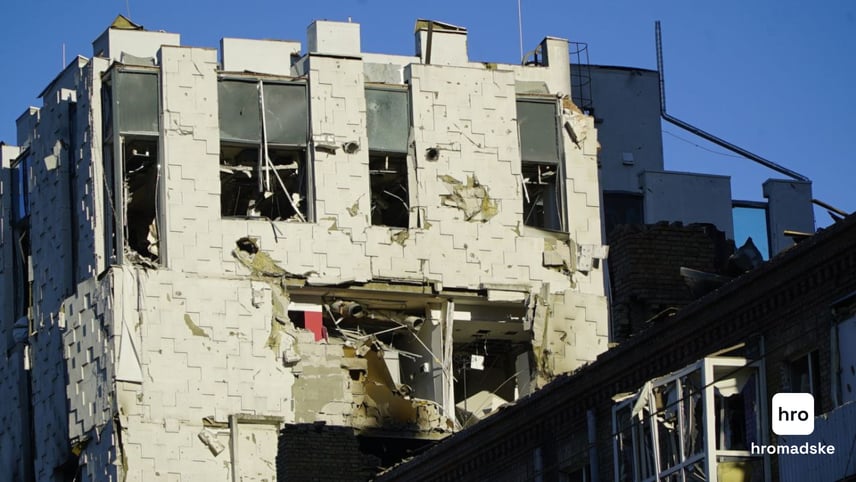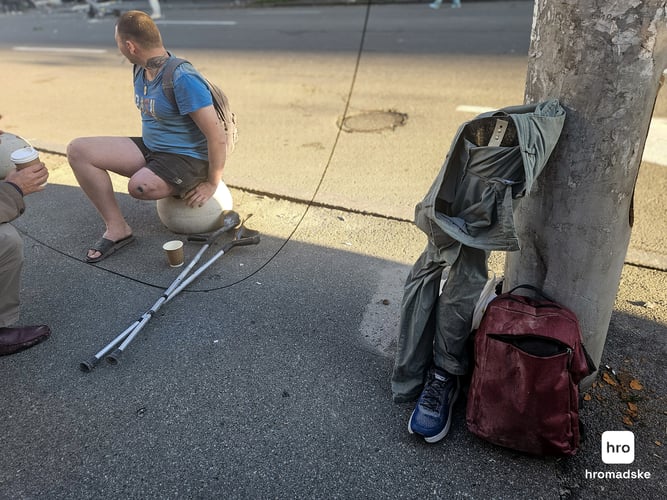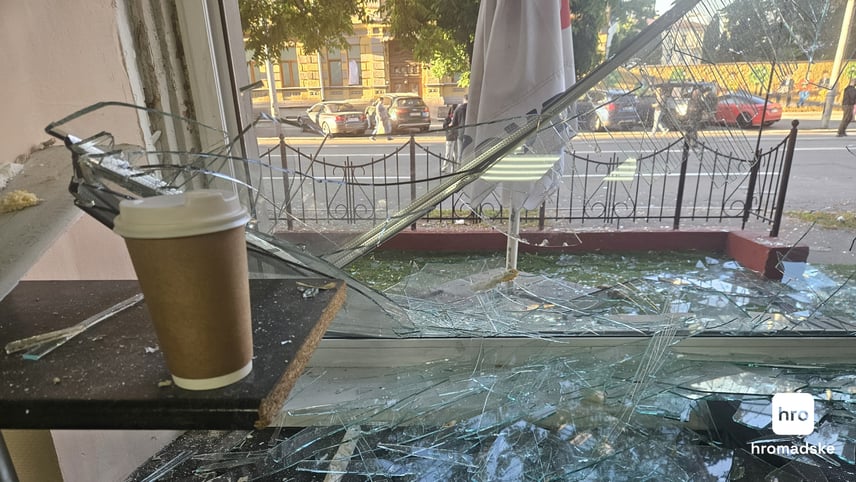Kyiv stands strong: Defiance amid the rubble

At night, a cruise missile flies over our building on Antonovycha Street, right in the heart of Kyiv. That sound—a distinct rustling—is unmistakable. In those few seconds, you think it’s the end, but then you remember: you won’t hear your missile. If you heard it, it’s already passed by.
A few seconds later, an explosion so loud rips through that you think again: this must be the end. You hear glass shattering in nearby buildings. Car alarms wail.
It’s not yet 7 a.m., and the air raid alert for the threat of Shahed drones is still ongoing, but people are already stepping outside. Some come to see if anyone needs help, others to start sweeping up the broken glass scattered across the sidewalks of an entire city block, and some to make coffee for those affected and those rescuing and helping.
It's a miracle, it's a miracle that I survived
I step out of my home, too. A few buildings down, the street is littered with broken glass. I notice in passing that this is the route I take to walk my child to school. It’s covered in shattered glass. So symbolic, I think. The glass glints in the sunlight like precious gems, making everything around seem surreal.
A few minutes’ walk away, I turn onto Zhylianska Street, where a missile likely struck one of the courtyards. People stand in silence, watching the rescuers and firefighters work. Some are in pajamas, some wrapped in blankets, and some managed to grab bags with belongings or their pets. Some came to help, others were just passing by.
Police officers stretch tape across the road. Curtains hang from windows that no longer have glass. Under one building, among a pile of glass, lies a Ukrainian flag—blown out of someone’s home by the blast wave. I pick it up.

On the sidewalk across from a five-story building where the missile strike collapsed the roof, partially brought down ceilings, and blew out all the windows, a woman stands motionless. She’s bathed in a stripe of sunlight, her light hair dusted with glass shards, sparkling in the sun.
“That’s my apartment up there, on the top floor, the fifth,” she says. “Where there’s no roof or ceiling left. It’s a miracle, a miracle I survived.”
Her name is Olena. She says that just before the missile hit, she stepped into the hallway because she wanted to sleep a few more hours in peace. That’s what saved her.
“The windows in the rooms blew out, the ceiling collapsed, the cabinets fell. All the crystal in those cabinets shattered,” she says, then waves her hand dismissively. “To hell with that crystal!”
She was buried under debris, lying face down, breathing through a denim jacket that had fallen on her from a hanger during the blast. Rescuers found and pulled Olena out. Unharmed, aside from a few cuts.
“I heard my neighbor screaming terribly; she was trapped, too. Her leg was badly injured, but the main thing is she’s alive. It seems no one in our building died—and that’s a real miracle.”
Olena says she didn’t have time to process anything, that she didn’t even hear the explosion—it was that loud.
I ask Olena if she has a place to stay or at least catch her breath, offering her to come to our place if needed. She smiles in response:
“Thank you, but everything’s fine. Everything’s fine.”
Everything. Fine.
Thank God the prosthesis is intact
Not far from Olena, a man sits on the curb, covered in gray dust. A military dog tag hangs around his neck, and crutches rest beside him. A few steps away, a prosthesis leans against a lamppost: he lost his left leg in combat, he says. His right foot, in a flip-flop with a Trident emblem, is cut by glass. His foot is red with blood. His right hand is cut, too.
“Thank God the prosthesis is intact,” he says, taking a drag on his cigarette. “Where would I get another one like it?”
He says his rehabilitation was long—across different cities in Ukraine and abroad.
“I’ve already fought my share,” he says, looking at the building. “I’m a lucky one; my apartment’s on the third floor. At least the ceiling didn’t collapse on my head.”

Another woman approaches us, anxiously offering people a place to rest at her home.
“I live right here, three minutes away,” she says. “I spent the night in the metro, but even there we heard those awful explosions. I can’t imagine what it was like for you.”
Coffee without syrup today?
Across the street, there’s a coffee shop. Its name includes the word “magic.” All its windows are blown out—the space in front and inside is covered with broken glass. A man sweeps up the glass outside, speaking English. He nods to indicate the coffee shop is open.
It’s just past 7 a.m. Inside, two women are making coffee for people who’ve already formed a small line. Everyone is calm and polite. The floor is sticky—the blast wave knocked over a shelf with bottles of various syrups.
“So, coffee without syrup today?” someone in line jokes.
“Why’s that?” the barista laughs. “Not all the bottles fell. Look, we’ve still got plenty. Caramel work for you?”

The woman makes coffee while a guy from the line offers to help knock down a piece of wall hanging over her head. As they try to dislodge the chunk together, the other barista wishes everyone a good day. From time to time, they thank the guys sweeping the glass outside the entrance. They explain: these are just people from the neighborhood who came to sweep, without anyone asking them to.
On the counter, there is a tip jar labeled “For a good mood.” It’s hard not to drop something in on a morning like this.
By 8 a.m., most of the glass on the streets has been swept into neat piles. Coffee shops, stores, Nova Poshta mail company—everything opens on schedule. People emerge from the damaged Chicago residential complex, where the blast wave blew out windows here and there, and sit at outdoor tables in the coffee shop on the ground floor. Ambulances and fire trucks race by.
Dog owners walk their pets in the nearby park. People hurry to work, reading the news on their phones. The air smells of smoke. Underfoot, glass shards crunch like the first snow. Something gets into my sandal—a tiny piece of the missile. On the road, small fragments, likely from the missile, lie scattered here and there. Even the smallest one can kill instantly. Death is so close now.
“To hell with them, not Kyiv,” a girl says into her phone while in line for coffee. “We’re not afraid of them.”
Kyiv clears the rubble, puts out fires. Kyiv mourns its dead. Kyiv rejoices for its living. After another terrifying night, the city begins its new day.
Author: Maria Semenchenko
- Share:
